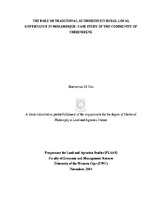| dc.contributor.advisor | Ntsebeza, Lungisile | |
| dc.contributor.advisor | Kepe, Thembela | |
| dc.contributor.author | Cau, Boaventura Manuel | |
| dc.contributor.other | Programme for Land and Agrarian Studies | |
| dc.contributor.other | Faculty of Economics and Management Sciences | |
| dc.date.accessioned | 2013-05-23T09:32:05Z | |
| dc.date.available | 2007/03/22 09:03 | |
| dc.date.available | 2007/03/30 | |
| dc.date.available | 2013-05-23T09:32:05Z | |
| dc.date.issued | 2004 | |
| dc.identifier.uri | http://hdl.handle.net/11394/201 | |
| dc.description | Magister Philosophiae (Land and Agrarian Studies) - MPhil(LAS) | en_US |
| dc.description.abstract | This study is about the place of traditional authorities in local level land administration and rural governance in contemporary Mozambique. It came about as a result of the publication of the Decree 15/2000 that recognised traditional authorities after their abolition more than 20 years earlier. This study seeks to examine four inter-related themes: the role of traditional authorities in local level land administration in Mozambique; why the government recognised traditional authorities in the year 2000 after having abolished them more than 20 years earlier; whether the recognition of hereditary traditional authorities is consistent with principles of democracy; and lastly to investigate whether the practices taking place on the ground are an expression of democracy as envisaged by the country’s constitution. The study is based on documental research on the subject, as well as on fieldwork in the community of Chirindzene, Gaza Province in Southern Mozambique. It argues that generalisations about the role of traditional authorities in local level land administration may be misleading. Drawing from the case study in Chirindzene, it shows that it was only the lowest level of the traditional authority structure (the lineage level) that continued having influence in land allocation and distribution after independence in this area. With regard to the recognition of traditional authorities, the study argues that an appreciation of the changing global context is important to understand this dramatic shift. The study argues that the Decree 15/2000 and its regulations are weakening the democratic experience initiated in 1970s by allowing rural populations be ruled by hereditary rulers who are not elected. For this reason, the rural population does not enjoy full citizenship rights because they are ruled by both elected structures and appointed ones. | en_US |
| dc.language.iso | en | en_US |
| dc.publisher | University of the Western Cape | en_US |
| dc.subject | Local government | en_US |
| dc.subject | Mozambique | en_US |
| dc.subject | Rural development | en_US |
| dc.subject | Community leadership | en_US |
| dc.title | The role of traditional authorities in rural local governance in Mozambique: case study of the community of Chirindzene | en_US |
| dc.type | Thesis | en_US |
| dc.rights.holder | University of the Western Cape | en_US |
| dc.description.country | South Africa | |

